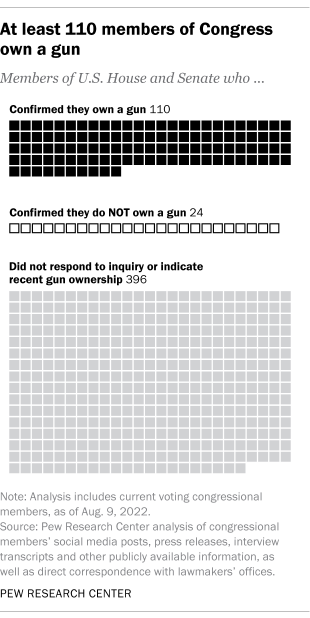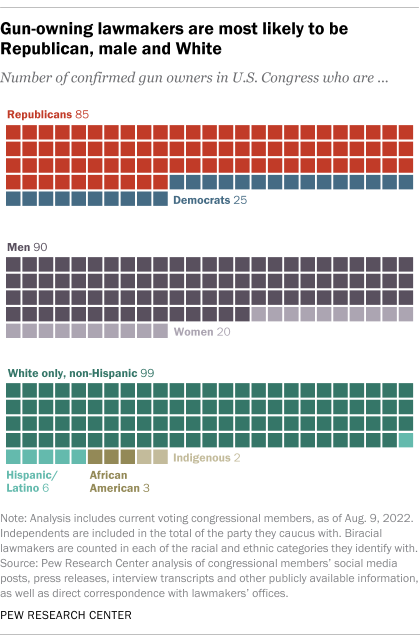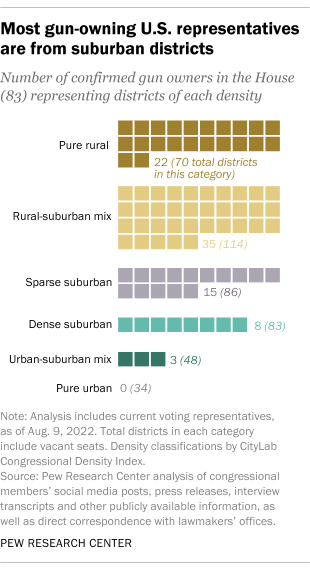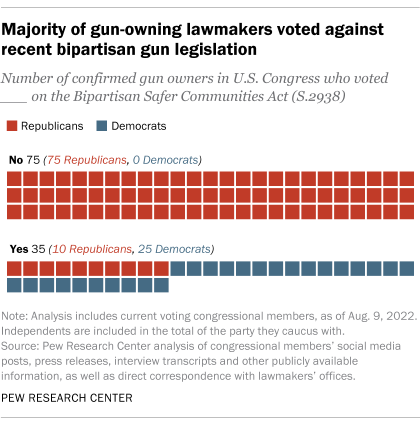Republicans in the United States are considerably more likely than Democrats to say they own a gun, as Pew Research Center surveys have consistently found. A similar pattern appears among members of Congress, according to a new analysis of lawmakers’ social media posts, press releases, interview transcripts and other publicly available information, as well as direct correspondence with lawmakers’ offices.
Overall, at least 110 representatives and senators in the current 117th Congress have publicly stated or otherwise confirmed that they own a gun as of Aug. 9. Around three-quarters of these confirmed congressional gun owners (85 of 110, or 77%) are members of the GOP, while the remainder (25 of 110, or 23%) are Democrats.

The partisan difference in gun ownership among members of Congress is greatest in the House, where Republicans make up 82% of confirmed gun owners (68 of 83) despite being a minority of the chamber. In the Senate, the difference is more modest: Republicans there account for 63% of confirmed gun owners (17 of 27) while making up half of the chamber.
While there are at least 110 confirmed gun owners in the current Congress, the actual figure may be substantially higher. Some lawmakers may own a gun but have not shared that information in press releases, social media posts or other venues over the past two years, and a large majority of lawmakers – 396 – did not respond to Pew Research Center inquiries seeking to confirm their gun ownership status. The offices of 24 other representatives and senators told the Center that they do not own a gun. The patterns discussed here, therefore, only reflect lawmakers who have publicly stated or otherwise confirmed that they own a gun. They do not reflect the larger group of lawmakers who have not indicated one way or another whether they own a firearm. (See “How we did this” for the complete methodology of this analysis.)
To get a sense of the patterns of gun ownership in the 117th Congress, Pew Research Center examined lawmakers’ social media posts, press releases, interview transcripts and other publicly available information from the past two years. We also reached out to every lawmaker in the House and Senate to ask whether or not they are a gun owner.
This analysis is limited to the lawmakers whose offices confirmed their status as gun owners, either by phone or email, or for whom we could find an unambiguous source, such as an up-to-date campaign website, that mentioned their gun ownership status. Overall, we found that at least 110 current members of Congress are gun owners, while 24 indicated they do not own a gun. However, because 396 current voting members have given no recent indication of their gun ownership status, these figures likely are undercounts. Some offices were only willing to confirm their lawmaker’s status as a gun owner on the condition that we kept their answers confidential. For that reason, we are not publicly identifying any of the confirmed gun owners.
Our analysis reflects the 530 voting members of Congress seated as of Aug. 9, 2022. However, the 234-193 breakdown of overall House votes on the Bipartisan Safer Communities Act includes one additional lawmaker, Rep. Jackie Walorski, R-Ind., who died on Aug. 3; it excludes Rep. Mike Floods, R-Neb., who was sworn into office on July 12 and therefore did not vote on the bill. Demographic breakdowns include biracial lawmakers in each of the racial and ethnic categories they identify with. Independents are counted with the party they caucus with.
To categorize all 435 U.S. House districts by their population density, we used the CityLab Congressional Density Index, which divides districts into six groups ranging from “Pure Rural” to “Pure Urban.”

Among Americans overall, three-in-ten adults report personally owning a gun, according to a Center survey conducted in June 2021. In that survey, Republicans and independents who lean to the GOP were about twice as likely as Democrats and Democratic-leaning independents to report owning a gun (44% vs. 20%). Men, White adults and those in rural areas were among the demographic groups in the overall population most likely to say they own a gun.

The demographic composition of confirmed gun owners among lawmakers in Washington follows roughly similar patterns, even after accounting for the fact that members of Congress are more likely than the overall population to be male and White. Men account for 82% of confirmed gun owners in Congress (90 of 110) – greater than their 72% share of lawmakers overall. And White lawmakers account for 90% of confirmed gun owners in Congress (99 of 110) while making up 75% of Congress as a whole.
Confirmed gun owners in Congress tend to represent more rural parts of the country. Just under eight-in-ten confirmed House gun owners (79%) represent “pure rural,” “rural-suburban” or “sparse suburban” districts, as classified by the CityLab Congressional Density Index. The remaining 16% of confirmed gun owners represent “dense suburban” or “urban-suburban” districts. Among the 34 House representatives from “pure urban” districts, there are no confirmed gun owners.
A large majority of confirmed gun owners in Congress voted against recent bipartisan gun legislation
In the wake of several high-profile mass shootings this year, Congress passed the first new major federal legislative restrictions on gun ownership in decades. The new law, known as the Bipartisan Safer Communities Act, includes provisions to enhance background checks for gun buyers ages 18 to 21 and incentivize states to enact “red flag” laws that enable firearms to be temporarily confiscated from people who are deemed dangerous, among other steps. In a Pew Research Center survey conducted in June, nearly two-thirds of U.S. adults (64%) said they approved of the law, while 21% said they disapproved.

While the law received bipartisan support in both legislative chambers – passing the House by a vote of 234-193 and the Senate by a vote of 65-33 – a large majority of confirmed gun owners in Congress (68%, or 75 of 110) voted against the measure.
But that pattern varied by chamber: In the House, just over three-quarters of confirmed gun owners (77%, or 64 of 83) voted against the bill, while in the Senate, a majority of confirmed gun owners (59%, or 16 of 27) voted for the bill. President Joe Biden, who signed the bill into law on June 25, noted in a public ceremony several weeks later that he is a gun owner himself.
Public displays with guns
An in-depth Pew Research Center survey in 2017 found that firearm ownership is central to many U.S. gun owners’ identity. The same appears to be true for some members of Congress.
Republican Reps. Lauren Boebert of Colorado and Greg Steube of Florida, for example, have each displayed guns during virtual House committee hearings recently.
Boebert – who until recently co-owned a gun-themed restaurant named Shooters Grill in her hometown of Rifle, Colorado – regularly exhibits her enthusiasm for guns on social media, where she has posted pictures of herself and her four children posing with guns in front of a Christmas tree. Rep. Thomas Massie, R-Ky., shared a similar holiday message on Twitter, posting a picture of his family in front of a Christmas tree with the caption, “Merry Christmas! ps. Santa, please bring ammo.”
Guns have also become a recurring theme in political advertising. As of late May, more than 100 Republican midterm ads featured guns as talking points or visual motifs, according to an analysis by The New York Times.
Still, public displays with firearms are more the exception than the rule among the congressional gun owners identified in this analysis, and some lawmakers prefer not to announce their gun ownership publicly. Several congressional offices contacted by the Center, for example, confirmed that their member of Congress owns a gun, but asked that the lawmaker not be identified by name.
